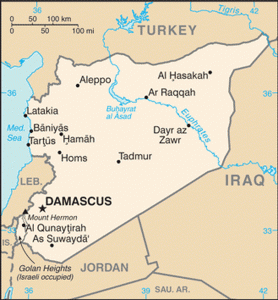 As I publish this piece Wednesday evening it is increasingly likely there will be military attacks on Syria by the US, Britain and allies in response to evidence that the Syrian government carried out chemical weapons attacks on its own citizens.
As I publish this piece Wednesday evening it is increasingly likely there will be military attacks on Syria by the US, Britain and allies in response to evidence that the Syrian government carried out chemical weapons attacks on its own citizens.
It is certainly a tense situation, and for the people of Syria the situation must be getting only more frightening. Media inside the country is tightly controlled by the government which exclusively airs the Assad regime’s viewpoint, and so it must be difficult to know what the true threat is, and what to expect.
I have been trying assess what outside information resources are available to the people of Syria, particularly radio, since it is inexpensive to receive and more difficult to block.
Inside many war-torn countries outside news and information is available via shortwave radio. Global broadcasters like the BBC and Deutsche Welle can be important sources of information and international political debate. Often there are broadcasts from political opponents, as is the case with Zimbabwe. However, Radio Free Syria, the last known anti-Assad shortwave broadcaster, hasn’t been heard from since about 2004. As well, like in Europe and North America, it appears that shortwave is not particularly popular inside Syria.
Satellite broadcasts, however, are popular in the Middle East where both international television and radio services are available. Due to their wide regional footprint satellite broadcasts easily cross borders, as long as local residents have reception equipment. In 2012 the Assad government was accused by the European Broadcasting Union of jamming the BBC, France 24, Deutsche Welle and the Voice of America. It is unclear if that jamming continues.
There are a couple of internet radio broadcasts for Syrians, originating outside of the country. We previously reported on Radio Rozana, which originates from Paris and plans to launch a satellite channel. Deutsche Welle recently reported on Baladna FM, staffed by exiled reporters in neighboring Jordan. Baladna is internet only at the moment.
Because there are methods for internet users in Syria to evade government filtering, determined listeners inside the country can find ways to tune in these independent broadcasts. But that still makes them less accessible than if they were on satellite or shortwave.
I would appreciate it if any readers with information about media and information availability inside Syria would email us to share.
Speaking for myself, I do not look forward to any military attacks on Syria. I have deep sympathy for the innocent Syrian people caught in their nation’s civil war, subject to brutal attacks from their own government, and now fearing attacks from western powers.


